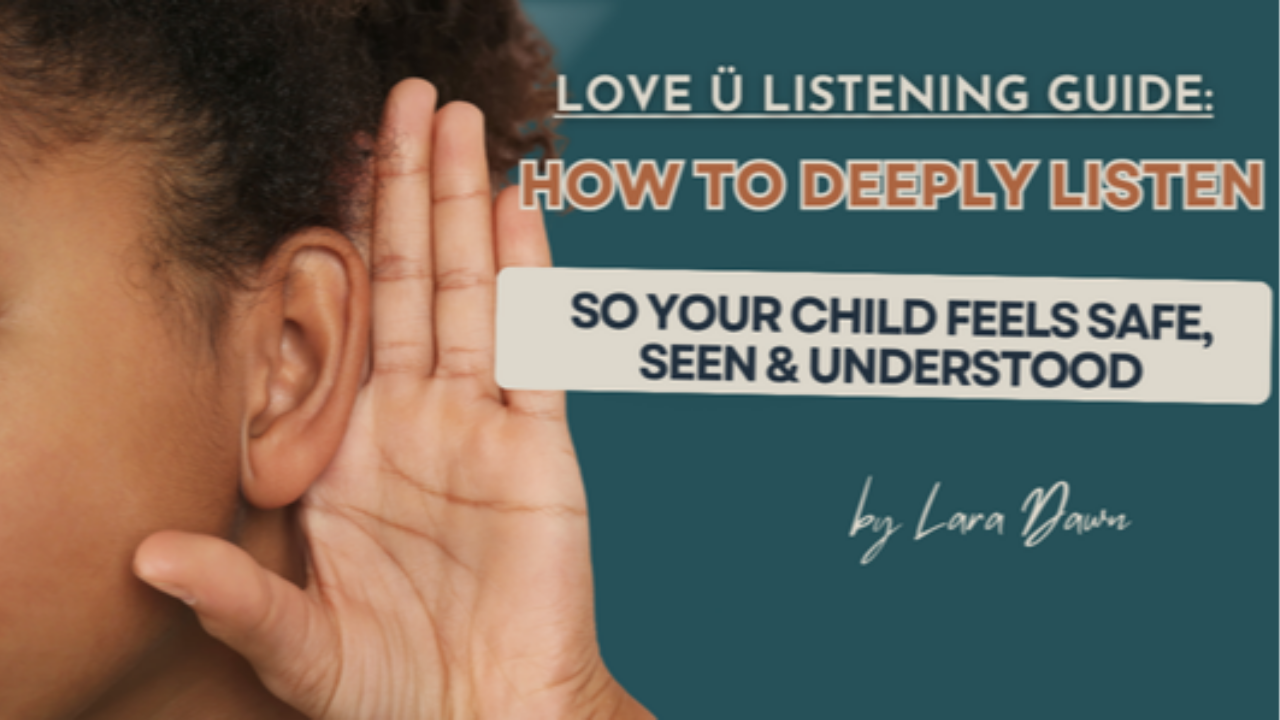
The Neuroscience of Deep Listening
May 30, 2025✨ LOVE Ü Listening Guide: How to Deeply Listen So Your Child Feels Safe, Seen & Understood
“Connection isn’t a reward for good behaviour—it’s the fuel your child’s brain needs to regulate, relate, and rise.” – Lara Dawn
Listening is NOT about compliance.
It’s about connection, co-regulation, and communication. This is part of the LOVE U Method that I teach in my new program, Parenting is Easy. Click here to learn more.
In the LOVE Ü Parenting Method, Listening Deeply is about hearing beneath the surface. It’s not about fixing or forcing. It’s not about nodding while waiting to correct or teach. It’s about presence. Stillness. Safety.
When your child feels genuinely heard, their nervous system relaxes. Their brain shifts out of “survival mode” and into “learning and growth mode.” And from there—everything changes.
🧠 The Neuroscience of Deep Listening
💡 Children’s brains are wired through relationships. According to Dr. Daniel Siegel and Dr. Tina Payne Bryson, “what’s shareable becomes bearable.” When a child shares their thoughts and feelings—and is met with attunement—they build stronger neural connections in their prefrontal cortex, the seat of emotional regulation, empathy, and executive function.
💡 The brain needs felt safety to function well. Dr. Stephen Porges’ Polyvagal Theory teaches us that connection precedes cooperation. Your child cannot hear you, learn from you, or follow directions if their nervous system feels unsafe. Listening deeply creates that safety.
💡 Mirror neurons activate when you attune. When you truly listen—eye contact, gentle posture, soft voice—you activate your child’s mirror neurons, helping them regulate through your calm energy. This is the essence of co-regulation.
🎧 What Deep Listening Sounds Like
You don’t need to solve it. You just need to stay with it.
Here are some powerful phrases that activate safety, not stress:
✅ “I hear you.”
✅ “That sounds really hard. Tell me more.”
✅ “I’m listening. Take your time.”
✅ “You don’t have to be okay for me to stay close.”
✅ “I’m so glad you told me.”
And for when boundaries are being tested:
✅ “You’re allowed to feel that way. And I’m still here to keep you safe.”
✅ “It makes sense you’re upset. I’ll help you through this.”
✅ “We can do hard things together.”
🚫 Listening ≠ Obeying
Let’s break this myth wide open: Just because your child heard you doesn’t mean they’re going to do what you asked. And that’s okay.
In fact—a child who pushes boundaries, questions rules, and says “no” is a child who feels safe enough to be themselves.
That’s leadership in the making.
That’s emotional intelligence.
That’s courage.
💥 Compliant kids don’t change the world. Connected kids do.
🌱 Why Listening First Works (Especially for ADHD Kids)
- It helps interrupt explosive cycles by calming the nervous system first.
- It teaches emotional intelligence, not just rule-following.
- It rewires the brain toward resilience, self-awareness, and internal motivation—which matters more than external rewards.
- It builds attachment security, the #1 predictor of future mental health and success.
💖 Your Listening Checklist
Before you respond to your child, ask yourself:
✔️ Am I regulated and present in my body?
✔️ Have I dropped my agenda and truly tuned in?
✔️ Am I holding space, not trying to fix or rush this moment?
✔️ Have I reminded myself that listening isn’t about control—it’s about connection?
🔔 Want to Go Deeper?
If this resonates—if you’re tired of power struggles and emotional meltdowns and want to raise emotionally intelligent kids without losing yourself in the process…
👑 Parenting is Easy is your next step.
It’s not a joke. It’s a revolution.
Inside the Parenting is Easy program, you’ll learn:
✅ How to co-regulate with your child without burning out
✅ How to set boundaries rooted in values, not punishment
✅ How to shift out of survival mode—together
✅ How to lead with love, structure, and emotional safety

